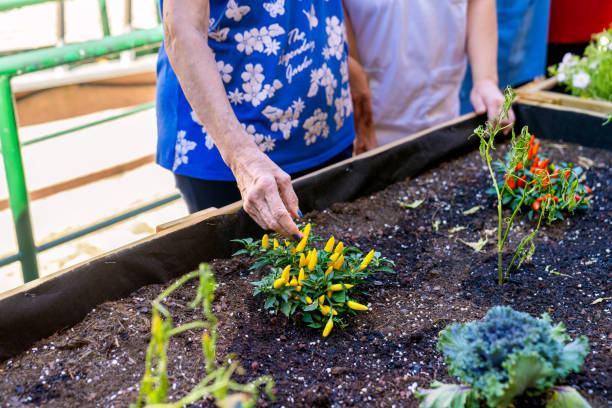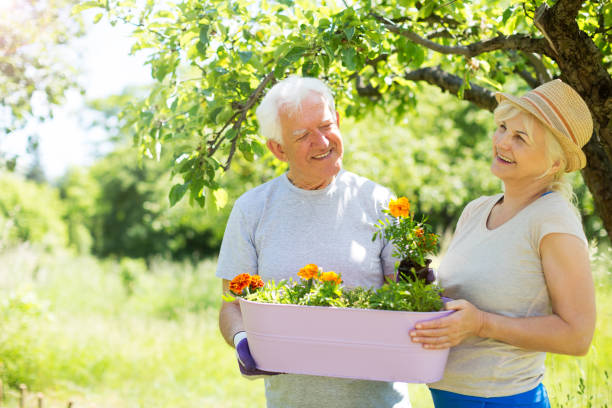Therapeutic gardening is an enriching practice that goes beyond the mere act of planting flowers or vegetables; it is a holistic approach that can significantly enhance the quality of life for seniors. As individuals age, the importance of maintaining both mental and physical health becomes paramount. Engaging with nature through gardening offers a multitude of benefits, including improved mood, reduced stress levels, and increased physical activity.
This nurturing experience not only fosters a sense of accomplishment but also provides an opportunity for social interaction, creativity, and a deeper connection with the environment. In this exploration of therapeutic gardening, we will uncover its profound impacts and practical approaches for seniors seeking to cultivate wellness through nature’s embrace.
Contents
The Benefits of Therapeutic Gardening for Seniors

Mental Health Benefits
Therapeutic gardening has a remarkable impact on mental well-being, particularly for seniors. Engaging in gardening tasks can decrease feelings of anxiety and depression by promoting a sense of purpose and accomplishment. The act of nurturing plants encourages mindfulness, allowing seniors to focus on the present moment and alleviate worries. Studies have shown that spending time in nature can elevate mood and reduce stress, creating a calming atmosphere that is essential for emotional resilience.
Physical Health Benefits
In addition to mental wellness, gardening offers significant physical health advantages. The various physical activities involved—such as digging, planting, weeding, and pruning—promote flexibility, strength, and endurance. These tasks can help maintain mobility and prevent age-related decline, making gardening an ideal form of exercise for seniors. Additionally, exposure to sunlight aids in the production of Vitamin D, further supporting bone health and immune function.
Social Interaction and Community Building
Gardening often provides opportunities for social engagement, which is particularly important for seniors who may experience isolation. Community gardens or group gardening programs foster connections among peers, allowing individuals to share experiences, knowledge, and techniques. These interactions not only build friendships but also create a sense of belonging and community that enhances overall well-being. By nurturing relationships through the shared joy of gardening, seniors can enrich their social lives and combat loneliness.
Environmental Benefits
Gardening not only contributes to personal health but also plays a vital role in promoting environmental sustainability. When individuals engage in gardening, they actively participate in enhancing their immediate surroundings and contribute positively to the ecosystem.
Biodiversity Enhancement
One of the primary environmental benefits of gardening is the increase in biodiversity. By planting a variety of flowers, fruits, and vegetables, gardeners provide habitats for various species, including pollinators such as bees, butterflies, and birds. This diversity within gardens helps to create a balanced ecosystem that is resilient and supports a wide range of wildlife.
Soil Health Improvement
Gardening practices such as composting and crop rotation greatly improve soil health. Composting adds organic matter back into the earth, enriching the soil with nutrients while promoting microbial life essential for plant growth. Healthy soil is a key component in preventing erosion and supporting water retention, which is crucial in mitigating the impacts of climate change.
Carbon Footprint Reduction
Gardening also aids in the reduction of one’s carbon footprint. By growing fresh produce at home, individuals can reduce reliance on commercial farming, which often involves significant transportation and packaging. Moreover, plants naturally absorb carbon dioxide from the atmosphere, contributing to cleaner air and helping to combat climate change. By fostering a garden, individuals take an essential step towards a more sustainable and ecologically responsible lifestyle.
Community Engagement Through Gardening
Gardening not only serves individual needs but also fosters community spirit and cooperation. By connecting with others in shared gardening spaces or community gardens, individuals can strengthen their relationships and work towards common environmental goals.
Collaborative Gardening Projects
Community gardens serve as collaborative hubs where individuals can come together to cultivate plants and share resources. These projects encourage teamwork, where participants learn from each other and engage in sustainable practices collectively. Such collaboration can lead to improved social ties and an enhanced sense of belonging.
Educational Opportunities
Gardening in community settings also provides valuable educational opportunities. Workshops and events can be organized to teach participants about sustainable gardening methods, organic practices, and the importance of biodiversity. This knowledge transfer empowers individuals to apply what they learn both in the community garden and in their gardening endeavors.
Food Security Initiatives
Moreover, community gardening can play a significant role in addressing food security. By growing fresh produce, communities can ensure access to healthy food options, particularly in areas deemed food deserts. These local efforts can alleviate some of the challenges associated with food access and promote healthier eating habits among residents.
Conclusion
Gardening is not just a personal hobby or a means for self-sufficiency, but it also has the potential to bring communities together and promote responsible living practices. By engaging in collaborative gardening projects, individuals can build stronger relationships, learn new skills, and contribute towards sustainable and environmentally friendly initiatives.
